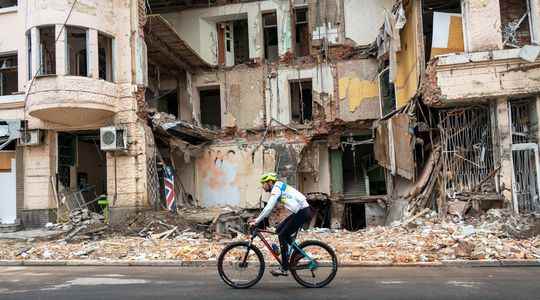Each new assessment of Ukrainian military advances, gradually reducing the territorial conquests of the Russian army, leaves its mark on a Vladimir Putin who does not intend to suffer without reacting. Summoned to do so by the hardest wing of his party, and increasingly agitated by public opinion hitherto muzzled on public television, which expresses its incomprehension as to the course of the war, the Russian president announced “massive strikes”.
“Russian air, ballistic and artillery forces are carrying out massive strikes against Ukrainian Armed Forces units in all operational areas,” the defense ministry said. Communication stunt or Moscow’s re-engagement in the conflict?
- Bombings in eastern Ukraine in reaction to the Ukrainian advance
Ukraine on Monday reported new military successes, saying it had reached the Russian border and restored control over the equivalent of seven times the area of kyiv in a month. During a meeting of the general staff on Tuesday, the Ukrainian president argued that “more than 4,000 km2 and more than 300 localities have been liberated. Stabilization measures are being implemented and the offensive continues” . According to the Institute for the Study of War (ISW), a US-based think tank, the Russian military, failing to reconstitute an impermeable body on the frontline in eastern Oblast of Kharkiv, redeploys on other axes. At the same time, where the Russian army has withdrawn, shells rain down, especially in the regions of Kharkiv and Donetsk.
The bombings are linked near Sloviansk, Konstantinivka and Bakhmout in eastern Ukraine, as well as in the southern regions of Mykolaiv and Zaporijia and in that of Kharkiv. On these lands, the Russian soldiers almost completely withdrew under the pressure of the advancing Ukrainian army. “Russian air, ballistic and artillery forces are carrying out massive strikes against units of the Ukrainian Armed Forces in all operational areas,” warned the Russian Defense Ministry.
- US pledges new military aid to support Ukrainian army’s ‘change of momentum’
Russian flags are torn down one after the other in previously invaded localities in eastern Ukraine. Enough to make the United States say that “a change of momentum on the part of the Ukrainian armed forces” is underway. The dazzling Ukrainian counter-offensive had an immediate effect on the American position since the White House, via its spokesperson, announced the forthcoming payment of new military aid. It must intervene “in the next few days”.
The Americans, however, are proving to be cautious and cautious about the words used to describe the evolution of the fighting. “I let President Zelensky (…) decide if he feels he has reached a turning point militarily, but clearly, at least in the Donbass, there is momentum,” said John Kirby , one of the National Security Council spokespersons attached to President Joe Biden. We will continue to support him. We are in close contact with the Ukrainians, we talk to them every day.”
Always faithful to its spirit of caution, the American ruling class multiplies the warnings: “This is war, and war is unpredictable.” This will not prevent him from supporting the country led by Volodymyr Zelensky. “A lot of the equipment we’ve delivered over the past few weeks and months has proven important and effective in the Ukrainians’ ability to go on the offensive,” added John Kirby.
- Europe questions how to force Russia to withdraw
It was first German Chancellor Olaf Scholz who lit the fuse. During a phone call on Tuesday with Russian President Vladimir Putin, he urged his counterpart to “complete withdrawal” of Russian forces from Ukraine. During the 30 minutes of exchange, the German leader “insisted with the Russian President that a diplomatic solution be found as quickly as possible, based on a ceasefire, a complete withdrawal of Russian troops and respect for territorial integrity and sovereignty of Ukraine,” according to a statement from the German Chancellery. At the same time, the German head of government is scolded within his own government coalition. It is called upon to deliver tanks likely to complete the successes of the Ukrainian counter-offensive. The chancellor tempers.
Before the European Parliament, the head of EU diplomacy Josep Borrell announced, also on Tuesday, that he was going to propose to the Member States to grant new financing for the supply of arms to Ukraine. Estonian Prime Minister Kaja Kallas and Lithuanian President Gitanas Nauseda called on French President Emmanuel Macron to increase his military aid to Ukraine, during a telephone conversation at the initiative of Paris.
Danish Defense Minister Morten Bødskov also spoke on the subject. He told the Danish agency Ritzau that his country was going to train Ukrainian soldiers on its soil. Lastly, the Finnish Prime Minister, Sanna Marin, took on the task of summoning the unity of the European Union. She considers that it is necessary to establish new sanctions against Russia in the face of its energy “blackmail”. In a vein comparable to that which ran through it throughout the first months of the war, Europe is faced with a dilemma: should it increase its military support for Ukraine in order to step up its reconquest of the territories lost to the risk of causing an epidermal reaction from Moscow? The night of the Foreign Ministers of the 27 Member States must have been short.
